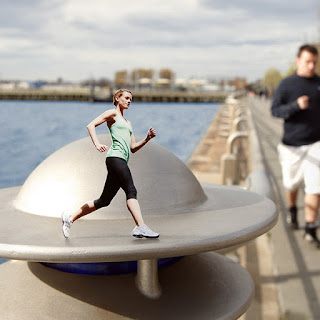The age-long question of how to
focus and retain more while studying may finally have been answered. I have seen
the likes of people who choose to tap their foot repeatedly for hours on end,
and I have seen people who will randomly get up and take a walk around the room
in order to clear their minds. But the real question is whether this sort of
physical activity, whether it be strenuous or not, can actually aid a person in
both learning and their concentration.
In April this year, a New York Times
article identified that in early 2012, scientists have finally found a
correlation that shows that “exercise appears to build a brain that resists physical
shrinkage and enhance cognitive flexibility.” Now a discovery like this can be
taken in two ways. For those who choose to exercise and keep fit, it comes as a
plus. They are already exercising and in addition to strengthening their heart,
they are also strengthening their minds.
On the other hand, many will doubt
this research saying that reading, studying, and all other forms of engaging
the mind allow for better neural networks to exist, not exercise. However, even Guitar
Zero by Gary Marcus can make the arguments that this physical practice, “At
the neural level, proceduralization consists of a wide array of carefully
coordinated processes, including changes to both gray matter (neural cell bodies)
and white matter (axons and dendrites that connect between neurons)” Leads a
person to create new neural networks for learning. (pg 52).
As added evidence that it doesn’t need
to be strenuous exercise, “a group of 120 older men and women were assigned to
walking or stretching programs for a major 2011 study, the walkers wound up
with larger hippocampi after a year.” (NY Times). This research proved that it
was simply the act of small physical activity that allows people to have a
large hippocampus, and this doesn’t even have to be done over a long period of
time. Studies show that effects can be drastically seen after only a month!
In
this same way, I believe that practicing guitar or any other instrument that
requires repeated practice with a physical component to it can actually aid you
in learning it faster and prolonging you memory. After all Marcus says, “Alas,
the only known way to defy the speed-accuracy trade-off is through practice,
using the only technique that the brain can bring to bear, a process known as
automatization or proceduralization, in which, the brain makes a transition
from explicit or “declarative” knowledge…” (pg 51).
Remember that kid that taps their
foot in the library or that person who constantly stands up and walks around
while working and seems to drive you nuts? Well, as it turns out, not only are
they benefitting their own brain network, but you can do it too! All it takes
is an elevated heart rate for a short period of time, and back to studying and
who knows, maybe you’ll remember everything you need for that Organic Chemistry
Exam next time!


No comments:
Post a Comment